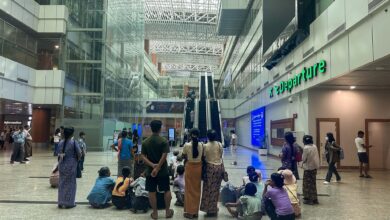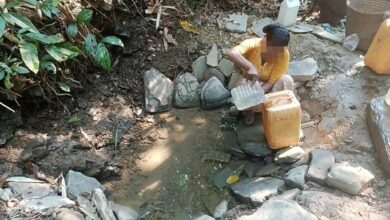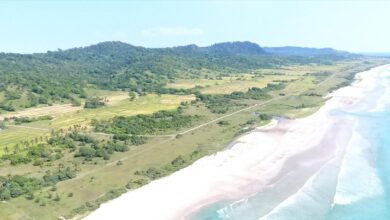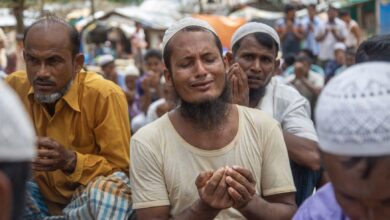
“Do you know my name?” shouts the rather heavyset man with the microphone.
He looks like someone the 20 or so curious onlookers ought to know, even if they didn’t. But before his audience could respond one way or the other, he makes his pitch: “Just remember me as someone who will strive to give you lives as precious and beautiful as a diamond.”
This line was a play on his name, Sein Win (“sein” means diamond in Myanmar). The man clearly knows a thing or two about how to stand out in a crowded electoral field. And no wonder: In his thirty-plus years in Myanmar politics, this was not the first time he has had to rebuild his brand.
To those who have followed his political career, he is better known as Maubin Sein Win, after the constituency in Ayeyarwady region that he currently represents, and which he first won in 1990.
But Maubin is a long way away from where he is now—in Pay Tone Myaung, a village in the Naypyitaw Union Territory township of Lewe, where he is running as a candidate for the party he formed after falling out with the ruling National League for Democracy (NLD) three years ago.
It was September 25, and Sein Win was doing his best to connect with the clutch of local people—mostly farmers—who had gathered to listen.
“If you can’t stay around for whatever reason, don’t worry about it. But I will be using my microphone to express my values, which you can judge for yourselves whether they are any good to you or not. So please pay attention,” he says with conviction.
As the founder of the National United Democratic (NUD) Party, Sein Win has thought long and hard about how best to convey his message, which is aimed mainly at Myanmar’s vast yet often overlooked ranks of rural agricultural workers.
He personally designed the party’s flag with this in mind: The light brown background represents the soil that most of his constituents must toil over, while a farmer in a conical bamboo hat gets pride of place in a depiction of three men at the center. (Last in line, in a winning display of professional humility, is a politician in a traditional gaung baung.)
But Sein Win’s political vision is not limited to the uplift of those living in Myanmar’s agrarian heartland: In the upper left-hand corner of the flag is another flag—a large white star on a light blue background, surrounded by 14 smaller stars—representing “federal democracy.”
For Sein Win, national unity begins at home. Perhaps that’s why he’s not flying solo in this, his latest attempt to remake his political career. This time, he has his son and his daughter by his side as co-pilots.
He says he convinced his children to run in the election by telling them that he wouldn’t go it alone.
“‘Kids,’ I said, ‘I will only register if you’re both with me.’” And so a new party, and a new political dynasty, was born.
His son, Kyaw Soe Moe, is contesting Mandalay region’s constituency 11, which includes all of Dekkhina, a district in Naypyitaw that encompasses both Lewe township, where his father is running, and Dekkhinathiri township, the constituency that his sister, Mya Myo Thuzar Win, hopes to represent in the Pyithu Hluttaw.
With the family patriarch as its chairman and the two siblings as central executive committee members, the NUD is confident of its chances of success at the polls.

Besides the father’s decades of political experience, the children have resources of their own that they feel should help the party’s prospects. Kyaw Soe Moe has a law degree and is managing director of the Kyaw Moe Min fertilizer company. He also runs Dollar Fish Crackers, another successful business.
Mya Myo Thuzar Win also has a business background, but says she is ready to devote herself full-time to politics if she wins. If not, she says, she will start a new company while helping her father with his political ventures.
But even as he leads by example, the father admits that it is no easy matter to get a new and totally unknown party off the ground, even with the whole family on board.
“Maubin was easier for me. Here, I have to build a whole new image from scratch. Damn, it’s tiring. Including the finances,” he complains.
In the less than three years that it has been around, the NUD has garnered around 3,000 members and spent about 80 million kyat, most of it raised by family members and the party’s central executive committee. (The lion’s share, it seems, comes from Sein Win’s salary and other personal income, his son’s support, and the sale of some of his wife’s possessions.)
Of the 1,170 constituencies up for grabs in November, the party is registered to contest just 16. While on the campaign trail in Lewe, Sein Win was accompanied by two motorbikes and an entourage of five.
As hard as it has been, however, Sein Win insists that all the time, money and energy that he has put into the party have been worth it.
“It has cost us a lot, but we’re happy. We’re really happy,” he laughs.
But it still rankles that Win Htein, an influential “patron” of the NLD, has claimed that Sein Win owes his current status as a sitting MP to the party’s backing.
“That’s simply not true. The NLD won in Maubin only after they got me,” Sein Win declares proudly.
This boast is not entirely baseless. In 1990, the year he first rode to victory in Maubin, he managed to defeat the NLD in a national election that the party won by a landslide. He lost a second bid in 2010, but not to the NLD, which boycotted that year’s election. But a year later, he decided to jump ship from the Democratic Party (Myanmar) and join the juggernaut that swept to power in 2015.
Sein Win’s fortunes rose with that tremendous surge of support for the NLD, but not for long. He enjoyed ministerial status within the new government, but clashed with members of his own party over parliamentary procedure. At one point, he even received a dressing down for leaving a meeting hall before the speaker of the Pyitthu Hluttaw.
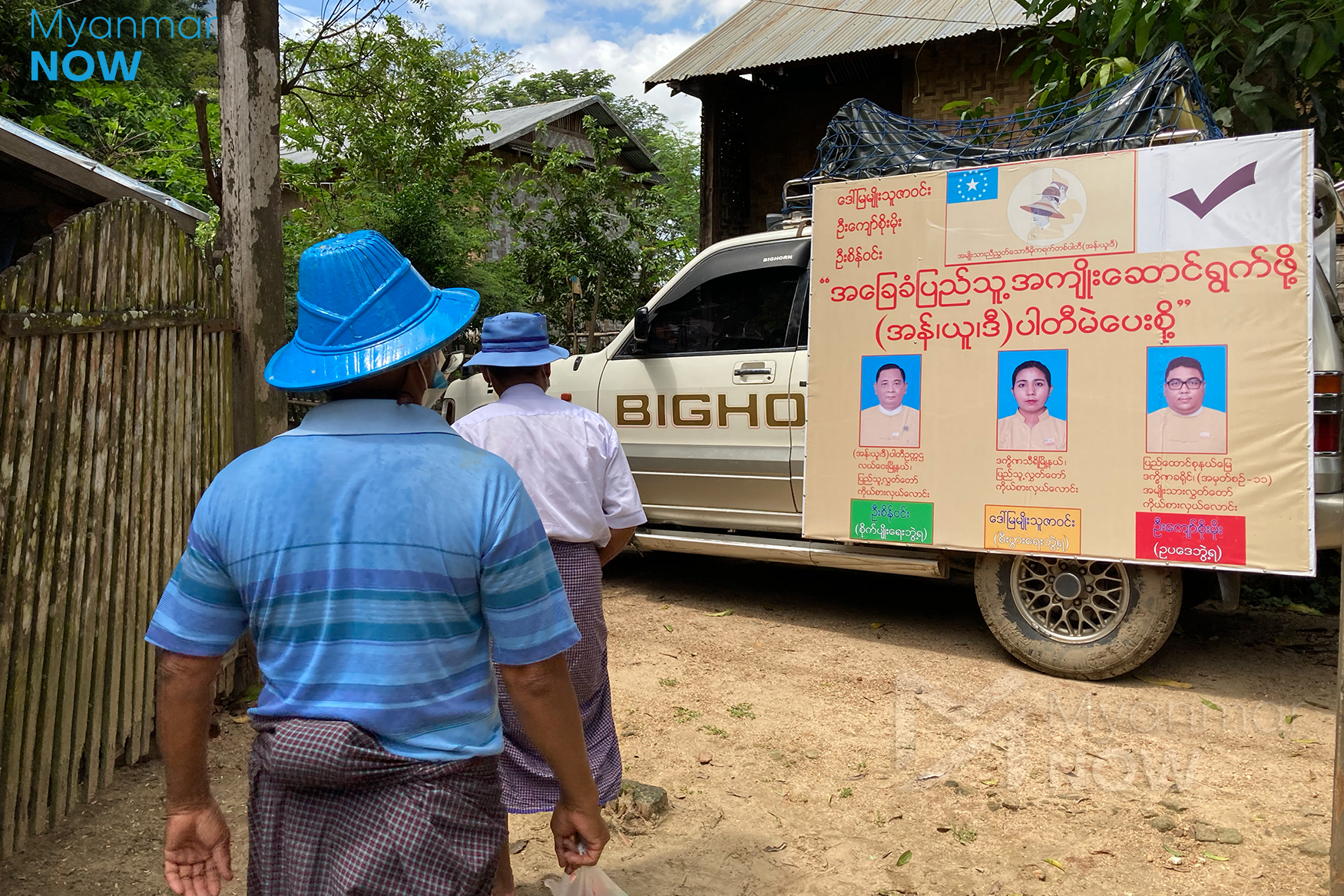
But the final straw, he says, was when he accused a number of people, including NLD members, of forging his signature in a letter that sided with a company locked in a land dispute with residents of Ma Lat Toh, a village in Ayeyarwady region.
As chair of the Pyithu Hluttaw’s Farmers and Laborers Affairs Committee at the time, Sein Win decided he had to resign from the position and leave the party—a move Win Htein would later call “impulsive.”
“I got off the NLD train because I wanted to arrive at the station of farmers’ rights, and I didn’t think the party was going there. So I built a new train of my own and founded a party that is firmly committed to reaching that destination,” he said.
Land confiscation is, he says, an issue of national importance, and one that he promises to address with the seriousness that it deserves. In this way, he believes, he can lead the country forward, towards an era of better and cleaner government.
But this isn’t the only issue that matters to him. In pamphlets distributed as part of his campaign, he also vows to maintain the status of Buddhism as the “national religion.”
Meanwhile, however, he has an election to win. He says he hopes his party can prevail in at least half the constituencies it is contesting. Beyond that, the sky’s the limit.
“If we had a billion kyat, for sure we could become the ruling party.”
After spending almost half of his 64 years engaged in politics, Sein Win says he understands the value of persistence. Slow and steady wins the race, he says, referencing the tale of the tortoise and the hare.
“But of course, the tortoise needs to be diligent, too.”
